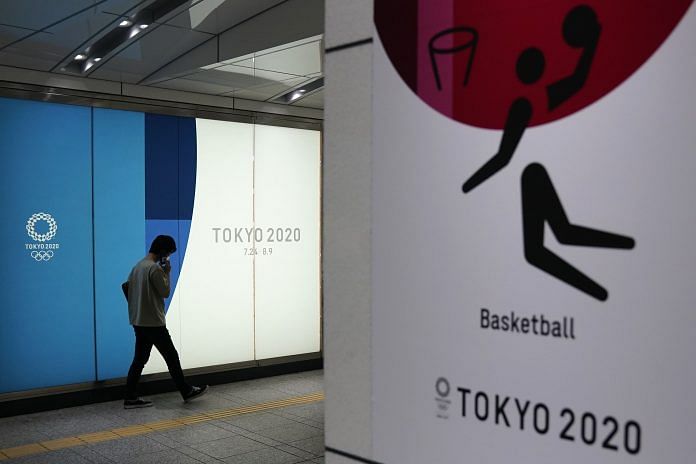Welcome to the Olympic Games, Covid edition. Hugs, high-fives and handshakes are unnecessary forms of contact. Cheering should be avoided, as should singing and shouting. And that’s even if anyone’s there to watch, since international visitors won’t be allowed in Japan and it’s unclear how many local people can go. For athletes and others who get in, remember to keep your distance — two meters, unless on the field of play.
The alternating Summer and Winter Games are the world’s biggest biennial party. Sure, they’re sporting events in celebration of humankind’s never-ending quest to be faster, higher and stronger. But at their core, the Olympics are a carnival of fitness and skill, dedication and determination. It’s a fundamentally social event where the most valuable social capital is a gold medal around your neck.
This year is different. It will be antisocial, antibacterial, and quite probably anticlimactic. While vaccines are being rolled out globally, the Covid-19 pandemic still continues — including in Tokyo, where the Japanese government has recommended extending a state of emergency by another fortnight to help prevent a fresh wave of infections.
As a kid, I used to think that every fourth year had an extra day because of the Olympics. This time, the games are being held not only in an odd year but likely the only one that will be a multiple of two prime numbers (43×47=2021).
For athletes, officials and spectators, the need to be Covid-safe means running away from the blood, sweat and tears that comes with the pursuit of elite physical performance. But more than that, the guidelines issued in an attempt to make the event more sanitary may end up disinfecting the games from the Olympic spirit that runs at their very core.
This Covid Playbook issued by the International Olympic Committee outlines rules for athletes, officials and media to follow at this year’s event — with the risk of being booted out if not followed. The guidelines mean no longer giving a congratulatory hug to the long-time rival who gallantly defeats you on the running track, or riding hand-in-hand in victory with a teammate at the velodrome. Those obligatory group high-fives on the volleyball court after every point could now be considered unnecessary.
Ever-politicized by wars, embargoes, dissent and nationalism, the Olympic Games still clings to the notion that sport transcends politics, cuts across borders and unites people. Athletes and officials are being told to limit contact with other people, not stray from the Olympic Village, avoid public transport, and remain within official venues. The Playbook’s warning is harsh:
“Repeated or serious failures to comply with these rules may result in the withdrawal of your accreditation and right to participate.”
Japan and the IOC are taking the health of athletes, officials and spectators seriously. Not going so far as to order the first cancellation since World War II, but enough to alleviate risks with states of emergency and prohibiting overseas spectators. They hope the scaled-down spectacle, scheduled July 23 to Aug. 8, won’t become a hotspot for further Covid-19 outbreaks.
There’s one eye on the clock. In February, Beijing hosts the Winter Games 14 years after holding the summer edition. China is determined to forge ahead, and Japan is keen to prove that it can pull off an event despite the global pandemic.
Hence, the strict but likely unenforceable rules, a track-and-trace app that barely works, and a reliance on the sense of fair play and goodwill of athletes and coaches at an event with a long history of being marred by the dishonest conduct of those few who don’t want to follow the rules.
Consider for a moment the plight of an athlete at these games. Being unable to compete is your worst nightmare. All other risks or punishments pale in comparison.
You’ve been training hard, sacrificing work, studies and social life each day for the past five years just to qualify. Tokyo 2020 was etched in your mental calendar, with the nightmare prospect last year of your dreams being canceled by the coronavirus giving way to hope for the rescheduled competition.
You’ve made it through the confusing logistical hoops that include Covid tests and restrictive transport to arrive at the Olympic Village. The opening ceremony has been run to a half-empty stadium. You wouldn’t have missed it for the world. Except now you’re feeling a little flush. A slight headache, mild cough. Nothing to worry about. You’re strong, an Olympic athlete, one of the world’s best.
Olympic protocols dictate reporting symptoms immediately to officials. You know you’ll be tested and, if found Covid-positive, barred from competing. But you wait. After day two of fever, you talk to your coach, who’s as invested as you are. Since the symptoms don’t seem too bad, you simply skip practice and rest a little more. The downside of coming clean is losing your chance at Olympic glory. The upside seems non-existent.
You’re called up for the next Covid test; one is due every four days. The coach says you’re out at the training venue, stuck in transport, unavailable, and will come by later. The overworked medical staff won’t be like the more-strict drug-testing officials. Finally, the fever has dissipated and you head out for training and hang with teammates and familiar competitors. It’s only two weeks later, maybe with a medal, that you start hearing about the new rounds of outbreaks hitting Tokyo.
Around the world, millions of viewers will tune in — enjoying the spectacle, but missing the roars of the crowd that bring the Olympics to life. Stadiums attendance may be sparse, cheers muted, and celebrations curt. But like the marathon which closes the calendar, the great challenge alone makes running the event worthwhile. The Olympic spotlight shines for only so long. Tokyo can’t miss grabbing its share before Beijing takes a turn.
Pandemic or not, the games must go on.-Bloomberg
Also read: Naga equestrian ranks world number 2 in show jumping, wants to represent India at Olympics



